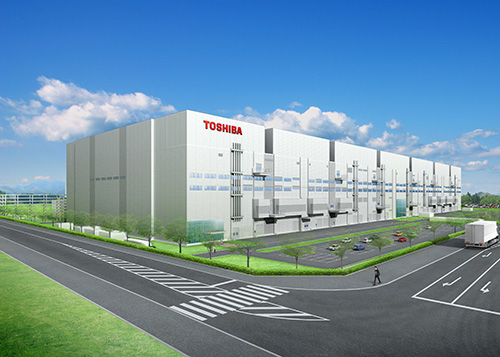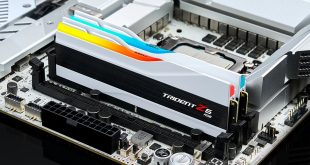Toshiba Corp. on Thursday announced that it has filed a civil suit against SK Hynix in a Japanese court. Toshiba accuses its rival of wrongful acquisition and use of Toshiba’s proprietary technical information related to NAND flash memory. The company demands compensation of its damages.
Toshiba filed the suit after learning that a former employee of SK Hynix has been arrested in Japan for alleged criminal infringement of the unfair competition prevention act. The employee previously worked for SanDisk in a NAND flash memory development project conducted in partnership with Toshiba at Yokkaichi Operations, Toshiba’s flash memory technology development and mass production base in Mie prefecture, Japan. The worker is accused of taking Toshiba’s proprietary technical information in 2008, and to of providing it to SK Hynix.
A Toshiba and SanDisk NAND flash memory manufacturing fab
SK Hynix is a business partner of Toshiba and the two companies probably share a lot of technology information in general. However, the companies are also competitors in NAND flash memory, one of Toshiba’s core technologies, and given the scope and importance of the misappropriated technical data involved, Toshiba has no reasonable option other than to seek legal redress, the company said.
Moving forward, Toshiba plans to construct a more robust system for protecting its intellectual property and preventing its loss, and respond determinedly to unfair competition, in order to sustain the advanced technical competence that is the source of its competitive strength.
KitGuru Says: While the fact that Toshiba, a top maker of NAND flash, sues SK Hynix, another leading supplier of flash memory, sounds like an important one, it may have a limited effect on the market. The result of the lawsuit will likely be a cross-licensing agreement and potentially a payment by SK Hynix to Toshiba. The plaintiff does not demand the defender to cease making NAND flash memory or even alter process technologies as soon as possible, so do not expect any disruptions with supply of flash memory. The spot prices may go up a bit for a while, but that will not last long (at least, DRAMeXchange has not reacted on the news by press time). If flash memory does not get more expensive, then solid-state drives, multimedia gadgets and memory cards will cost the same amount of money as they do today.
 KitGuru KitGuru.net – Tech News | Hardware News | Hardware Reviews | IOS | Mobile | Gaming | Graphics Cards
KitGuru KitGuru.net – Tech News | Hardware News | Hardware Reviews | IOS | Mobile | Gaming | Graphics Cards



